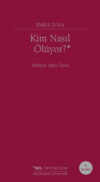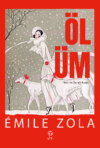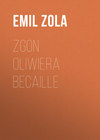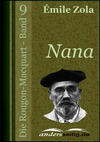Kitabı oku: «His Masterpiece», sayfa 7
Thereupon they all broke out into imprecations, for this question of the hanging committee was the everlasting subject of their wrath. They demanded reforms; every one had a solution of the problem ready – from universal suffrage, applied to the election of a hanging committee, liberal in the widest sense of the word, down to unrestricted liberty, a Salon open to all exhibitors.8
While the others went on discussing the subject, Gagniere drew Mahoudeau to the open window, where, in a low voice, his eyes the while staring into space, he murmured:
‘Oh, it’s nothing at all, only four bars; a simple impression jotted down there and then. But what a deal there is in it! To me it’s first of all a landscape, dwindling away in the distance; a bit of melancholy road, with the shadow of a tree that one cannot see; and then a woman passes along, scarcely a silhouette; on she goes and you never meet her again, no, never more again.’
Just at that moment, however, Fagerolles exclaimed, ‘I say, Gagniere, what are you going to send to the Salon this year?’
Gagniere did not hear, but continued talking, enraptured, as it were.
‘In Schumann one finds everything – the infinite. And Wagner, too, whom they hissed again last Sunday!’
But a fresh call from Fagerolles made him start.
‘Eh! what? What am I going to send to the Salon? A small landscape, perhaps; a little bit of the Seine. It is so difficult to decide; first of all I must feel pleased with it myself.’
He had suddenly become timid and anxious again. His artistic scruples, his conscientiousness, kept him working for months on a canvas the size of one’s hand. Following the track of the French landscape painters, those masters who were the first to conquer nature, he worried about correctness of tone, pondering and pondering over the precise value of tints, till theoretical scruples ended by making his touch heavy. And he often did not dare to chance a bright dash of colour, but painted in a greyish gloomy key which was astonishing, when one remembered his revolutionary passions.
‘For my part,’ said Mahoudeau, ‘I feel delighted at the prospect of making them squint with my woman.’
Claude shrugged his shoulders. ‘Oh! you’ll get in, the sculptors have broader minds than the painters. And, besides, you know very well what you are about; you have something at your fingers’ ends that pleases. There will be plenty of pretty bits about your vintaging girl.’
The compliment made Mahoudeau feel serious. He posed above all for vigour of execution; he was unconscious of his real vein of talent, and despised gracefulness, though it ever invincibly sprung from his big, coarse fingers – the fingers of an untaught working-man – like a flower that obstinately sprouts from the hard soil where the wind has flung its seed.
Fagerolles, who was very cunning, had decided to send nothing, for fear of displeasing his masters; and he chaffed the Salon, calling it ‘a foul bazaar, where all the bad painting made even the good turn musty.’ In his inmost heart he was dreaming of one day securing the Rome prize, though he ridiculed it, as he did everything else.
However, Jory stationed himself in the middle of the room, holding up his glass of beer. Sipping every now and then, he declared: ‘Well, your hanging committee quite disgusts me! I say, shall I demolish it? I’ll begin bombarding it in our very next number. You’ll give me some notes, eh? and we’ll knock it to pieces. That will be fine fun.’
Claude was at last fully wound up, and general enthusiasm prevailed. Yes, yes, they must start a campaign. They would all be in it, and, pressing shoulder to shoulder, march to the battle together. At that moment there was not one of them who reserved his share of fame, for nothing divided them as yet; neither the profound dissemblance of their various natures, of which they themselves were ignorant, nor their rivalries, which would some day bring them into collision. Was not the success of one the success of all the others? Their youth was fermenting, they were brimming over with mutual devotion; they indulged anew in their everlasting dream of gathering into a phalanx to conquer the world, each contributing his individual effort; this one helping that one forward, and the whole band reaching fame at once in one row. Claude, as the acknowledged chief, was already sounding the victory, distributing laurels with such lyrical abundance that he overlooked himself. Fagerolles himself, gibing Parisian though he might be, believed in the necessity of forming an army; while even Jory, although he had a coarser appetite, with a deal of the provincial still about him, displayed much useful comradeship, catching various artistic phrases as they fell from his companions’ lips, and already preparing in his mind the articles which would herald the advent of the band and make them known. And Mahoudeau purposely exaggerated his intentional roughness, and clasped his hands like an ogre kneading human flesh; while Gagniere, in ecstasy, as if freed from the everlasting greyishness of his art, sought to refine sensation to the utmost limits of intelligence; and Dubuche, with his matter-of-fact convictions, threw in but a word here and there; words, however, which were like club-blows in the very midst of the fray. Then Sandoz, happy and smiling at seeing them so united, ‘all in one shirt,’ as he put it, opened another bottle of beer. He would have emptied every one in the house.
‘Eh?’ he cried, ‘we’re agreed, let’s stick to it. It’s really pleasant to come to an understanding among fellows who have something in their nuts, so may the thunderbolts of heaven sweep all idiots away!’
At that same moment a ring at the bell stupefied him. Amidst the sudden silence of the others, he inquired – ‘Who, to the deuce, can that be – at eleven o’clock?’
He ran to open the door, and they heard him utter a cry of delight. He was already coming back again, throwing the door wide open as he said – ‘Ah! it’s very kind indeed to think of us and surprise us like this! Bongrand, gentlemen.’
The great painter, whom the master of the house announced in this respectfully familiar way, entered, holding out both hands. They all eagerly rose, full of emotion, delighted with that manly, cordial handshake so willingly bestowed. Bongrand was then forty-five years old, stout, and with a very expressive face and long grey hair. He had recently become a member of the Institute, and wore the rosette of an officer of the Legion of Honour in the top button-hole of his unpretentious alpaca jacket. He was fond of young people; he liked nothing so much as to drop in from time to time and smoke a pipe among these beginners, whose enthusiasm warmed his heart.
‘I am going to make the tea,’ exclaimed Sandoz.
When he came back from the kitchen, carrying the teapot and cups, he found Bongrand installed astride a chair, smoking his short cutty, amidst the din which had again arisen. Bongrand himself was holding forth in a stentorian voice. The grandson of a farmer of the Beauce region, the son of a man risen to the middle classes, with peasant blood in his veins, indebted for his culture to a mother of very artistic tastes, he was rich, had no need to sell his pictures, and retained many tastes and opinions of Bohemian life.
‘The hanging committee? Well, I’d sooner hang myself than belong to it!’ said he, with sweeping gestures. ‘Am I an executioner to kick poor devils, who often have to earn their bread, out of doors?’
‘Still, you might render us great service by defending our pictures before the committee,’ observed Claude.
‘Oh, dear, no! I should only make matters worse for you – I don’t count; I’m nobody.’
There was a chorus of protestations; Fagerolles objected, in a shrill voice:
‘Well, if the painter of “The Village Wedding” does not count – ’
But Bongrand was getting angry; he had risen, his cheeks afire.
‘Eh? Don’t pester me with “The Wedding”; I warn you I am getting sick of that picture. It is becoming a perfect nightmare to me ever since it has been hung in the Luxembourg Museum.’
This ‘Village Wedding’ – a party of wedding guests roaming through a corn-field, peasants studied from life, with an epic look of the heroes of Homer about them – had so far remained his masterpiece. The picture had brought about an evolution in art, for it had inaugurated a new formula. Coming after Delacroix, and parallel with Courbet, it was a piece of romanticism tempered by logic, with more correctness of observation, more perfection in the handling. And though it did not squarely tackle nature amidst the crudity of the open air, the new school claimed connection with it.
‘There can be nothing more beautiful,’ said Claude, ‘than the two first groups, the fiddler, and then the bride with the old peasant.’
‘And the strapping peasant girl, too,’ added Mahoudeau; the one who is turning round and beckoning! I had a great mind to take her for the model of a statue.’
‘And that gust of wind among the corn,’ added Gagniere, ‘and the pretty bit of the boy and girl skylarking in the distance.’
Bongrand sat listening with an embarrassed air, and a smile of inward suffering; and when Fagerolles asked him what he was doing just then, he answered, with a shrug of his shoulders:
‘Well, nothing; some little things. But I sha’n’t exhibit this time. I should like to find a telling subject. Ah, you fellows are happy at still being at the bottom of the hill. A man has good legs then, he feels so plucky when it’s a question of getting up. But when once he is a-top, the deuce take it! the worries begin. A real torture, fisticuffs, efforts which must be constantly renewed, lest one should slip down too quickly. Really now, one would prefer being below, for the pleasure of still having everything to do – Ah, you may laugh, but you’ll see it all for yourselves some day!’
They were indeed laughing, thinking it a paradox, or a little piece of affectation, which they excused. To be hailed, like Bongrand, with the name of master – was that not the height of bliss? He, with his arms resting on the back of his chair, listened to them in silence, leisurely puffing his pipe, and renouncing the idea of trying to make them understand him.
Meanwhile, Dubuche, who had rather domesticated tastes, helped Sandoz to hand the tea round, and the din continued. Fagerolles related a story about Daddy Malgras and a female cousin by marriage, whom the dealer offered as a model on conditions that he was given a presentment of her in oils. Then they began to talk of models. Mahoudeau waxed furious, because the really well-built female models were disappearing. It was impossible to find one with a decent figure now. Then suddenly the tumult increased again; Gagniere was being congratulated about a connoisseur whose acquaintance he had made in the Palais Royal one afternoon, while the band played, an eccentric gentleman living on a small income, who never indulged in any other extravagance than that of buying pictures. The other artists laughed and asked for the gentleman’s address. Then they fell foul of the picture dealers, dirty black-guards, who preyed on artists and starved them. It was really a pity that connoisseurs mistrusted painters to such a degree as to insist upon a middleman under the impression that they would thus make a better bargain. This question of bread and butter excited them yet more, though Claude showed magnificent contempt for it all. The artist was robbed, no doubt, but what did that matter, if he had painted a masterpiece, and had some water to drink? Jory, having again expressed some low ideas about lucre, aroused general indignation. Out with the journalist! He was asked stringent questions. Would he sell his pen? Would he not sooner chop off his wrist than write anything against his convictions? But they scarcely waited for his answer, for the excitement was on the increase; it became the superb madness of early manhood, contempt for the whole world, an absorbing passion for good work, freed from all human weaknesses, soaring in the sky like a very sun. Ah! how strenuous was their desire to lose themselves, consume themselves, in that brazier of their own kindling!
Bongrand, who had not stirred the while, made a vague gesture of suffering at the sight of that boundless confidence, that boisterous joy at the prospect of attack. He forgot the hundred paintings which had brought him his glory, he was thinking of the work which he had left roughed out on his easel now. Taking his cutty from between his lips, he murmured, his eyes glistening with kindliness, ‘Oh, youth, youth!’
Until two in the morning, Sandoz, who seemed ubiquitous, kept on pouring fresh supplies of hot water into the teapot. From the neighbourhood, now asleep, one now only heard the miawing of an amorous tabby. They all talked at random, intoxicated by their own words, hoarse with shouting, their eyes scorched, and when at last they made up their minds to go, Sandoz took the lamp to show them a light over the banisters, saying very softly:
‘Don’t make a noise, my mother is asleep.’
The hushed tread of their boots on the stairs died away at last, and deep silence fell upon the house.
It struck four. Claude, who had accompanied Bongrand, still went on talking to him in the deserted streets. He did not want to go to bed; he was waiting for daylight, with impatient fury, so that he might set to work at his picture again. This time he felt certain of painting a masterpiece, exalted as he was by that happy day of good-fellowship, his mind pregnant with a world of things. He had discovered at last what painting meant, and he pictured himself re-entering his studio as one returns into the presence of a woman one adores, his heart throbbing violently, regretting even this one day’s absence, which seemed to him endless desertion. And he would go straight to his canvas, and realise his dream in one sitting. However, at every dozen steps or so, amidst the flickering light of the gaslamps, Bongrand caught him by a button of his coat, to repeat to him that, after all, painting was an accursed trade. Sharp as he, Bongrand, was supposed to be, he did not understand it yet. At each new work he undertook, he felt as if he were making a debut; it was enough to make one smash one’s head against the wall. The sky was now brightening, some market gardeners’ carts began rolling down towards the central markets; and the pair continued chattering, each talking for himself, in a loud voice, beneath the paling stars.
IV
SIX weeks later, Claude was painting one morning amidst a flood of sunshine that streamed through the large window of his studio. Constant rain had made the middle of August very dull, but his courage for work returned with the blue sky. His great picture did not make much progress, albeit he worked at it throughout long, silent mornings, like the obstinate, pugnacious fellow he was.
All at once there came a knock at his door. He thought that Madame Joseph, the doorkeeper, was bringing up his lunch, and as the key was always in the door, he simply called: ‘Come in!’
The door had opened; there was a slight rustle, and then all became still. He went on painting without even turning his head. But the quivering silence, and the consciousness of some vague gentle breathing near him, at last made him fidgety. He looked up, and felt amazed; a woman stood there clad in a light gown, her features half-hidden by a white veil, and he did not know her, and she was carrying a bunch of roses, which completed his bewilderment.
All at once he recognised her.
‘You, mademoiselle? Well, I certainly didn’t expect you!’
It was Christine. He had been unable to restrain that somewhat unamiable exclamation, which was a cry from the heart itself. At first he had certainly thought of her; then, as the days went by for nearly a couple of months without sign of life from her, she had become for him merely a fleeting, regretted vision, a charming silhouette which had melted away in space, and would never be seen again.
‘Yes, monsieur, it’s I. I wished to come. I thought it was wrong not to come and thank you – ’
She blushed and stammered, at a loss for words. She was out of breath, no doubt through climbing the stairs, for her heart was beating fast. What! was this long-debated visit out of place after all? It had ended by seeming quite natural to her. The worst was that, in passing along the quay, she had bought that bunch of roses with the delicate intention of thereby showing her gratitude to the young fellow, and the flowers now dreadfully embarrassed her. How was she to give them to him? What would he think of her? The impropriety of the whole proceeding had only struck her as she opened the door.
But Claude, more embarrassed still, resorted to exaggerated politeness. He had thrown aside his palette and was turning the studio upside down in order to clear a chair.
‘Pray be seated, mademoiselle. This is really a surprise. You are too kind.’
Once seated, Christine recovered her equanimity. He looked so droll with his wild sweeping gestures, and she felt so conscious of his shyness that she began to smile, and bravely held out the bunch of roses.
‘Look here; I wished to show you that I am not ungrateful.’
At first he said nothing, but stood staring at her, thunderstruck. When he saw, though, that she was not making fun of him, he shook both her hands, with almost sufficient energy to dislocate them. Then he at once put the flowers in his water-jug, repeating:
‘Ah! now you are a good fellow, you really are. This is the first time I pay that compliment to a woman, honour bright.’
He came back to her, and, looking straight into her eyes, he asked:
‘Then you have not altogether forgotten me?’
‘You see that I have not,’ she replied, laughing.
‘Why, then, did you wait two months before coming to see me?’
Again she blushed. The falsehood she was about to tell revived her embarrassment for a moment.
‘But you know that I am not my own mistress,’ she said. ‘Oh, Madame Vanzade is very kind to me, only she is a great invalid, and never leaves the house. But she grew anxious as to my health and compelled me to go out to breathe a little fresh air.’
She did not allude to the shame which she had felt during the first few days after her adventure on the Quai de Bourbon. Finding herself in safety, beneath the old lady’s roof, the recollection of the night she had spent in Claude’s room had filled her with remorse; but she fancied at last that she had succeeded in dismissing the matter from her mind. It was no longer anything but a bad dream, which grew more indistinct each day. Then, how it was she could not tell, but amidst the profound quietude of her existence, the image of that young man who had befriended her had returned to her once more, becoming more and more precise, till at last it occupied her daily thoughts. Why should she forget him? She had nothing to reproach him with; on the contrary, she felt she was his debtor. The thought of seeing him again, dismissed at first, struggled against later on, at last became an all-absorbing craving. Each evening the temptation to go and see him came strong upon her in the solitude of her own room. She experienced an uncomfortable irritating feeling, a vague desire which she could not define, and only calmed down somewhat on ascribing this troubled state of mind to a wish to evince her gratitude. She was so utterly alone, she felt so stifled in that sleepy abode, the exuberance of youth seethed so strongly within her, her heart craved so desperately for friendship!
‘So I took advantage of my first day out,’ she continued. ‘And besides, the weather was so nice this morning after all the dull rain.’
Claude, feeling very happy and standing before her, also confessed himself, but he had nothing to hide.
‘For my part,’ said he, ‘I dared not think of you any more. You are like one of the fairies of the story-books, who spring from the floor and disappear into the walls at the very moment one least expects it; aren’t you now? I said to myself, “It’s all over: it was perhaps only in my fancy that I saw her come to this studio.” Yet here you are. Well, I am pleased at it, very pleased indeed.’
Smiling, but embarrassed, Christine averted her head, pretending to look around her. But her smile soon died away. The ferocious-looking paintings which she again beheld, the glaring sketches of the South, the terrible anatomical accuracy of the studies from the nude, all chilled her as on the first occasion. She became really afraid again, and she said gravely, in an altered voice:
‘I am disturbing you; I am going.’
‘Oh! not at all, not at all,’ exclaimed Claude, preventing her from rising. ‘It does me good to have a talk with you, for I was working myself to death. Oh! that confounded picture; it’s killing me as it is.’
Thereupon Christine, lifting her eyes, looked at the large picture, the canvas that had been turned to the wall on the previous occasion, and which she had vainly wished to see.
The background – the dark glade pierced by a flood of sunlight – was still only broadly brushed in. But the two little wrestlers – the fair one and the dark – almost finished by now, showed clearly in the light. In the foreground, the gentleman in the velveteen jacket, three times begun afresh, had now been left in distress. The painter was more particularly working at the principal figure, the woman lying on the grass. He had not touched the head again. He was battling with the body, changing his model every week, so despondent at being unable to satisfy himself that for a couple of days he had been trying to improve the figure from imagination, without recourse to nature, although he boasted that he never invented.
Christine at once recognised herself. Yes, that nude girl sprawling on the grass, one arm behind her head, smiling with lowered eyelids, was herself, for she had her features. The idea absolutely revolted her, and she was wounded too by the wildness of the painting, so brutal indeed that she considered herself abominably insulted. She did not understand that kind of art; she thought it execrable, and felt a hatred against it, the instinctive hatred of an enemy. She rose at last, and curtly repeated, ‘I must be going.’
Claude watched her attentively, both grieved and surprised by her sudden change of manner.
‘Going already?’
‘Yes, they are waiting for me. Good-bye.’
And she had already reached the door before he could take her hand, and venture to ask her:
‘When shall I see you again?’
She allowed her hand to remain in his. For a moment she seemed to hesitate.
‘I don’t know. I am so busy.’
Then she withdrew her hand and went off, hastily, saying: ‘One of these days, when I can. Good-bye.’
Claude remained stock-still on the threshold. He wondered what had come over her again to cause her sudden coolness, her covert irritation. He closed the door, and walked about, with dangling arms, and without understanding, seeking vainly for the phrase, the gesture that could have offended her. And he in his turn became angry, and launched an oath into space, with a terrific shrug of the shoulders, as if to rid himself of this silly worry. Did a man ever understand women? However, the sight of the roses, overlapping the water-jug, pacified him; they smelt so sweet. Their scent pervaded the whole studio, and silently he resumed his work amidst the perfume.
Two more months passed by. During the earlier days Claude, at the slightest stir of a morning, when Madame Joseph brought him up his breakfast or his letters, quickly turned his head, and could not control a gesture of disappointment. He no longer went out until after four, and the doorkeeper having told him one evening, on his return home, that a young person had called to see him at about five, he had only grown calm on ascertaining that the visitor was merely a model, Zoe Piedefer. Then, as the days went by, he was seized with a furious fit of work, becoming unapproachable to every one, indulging in such violent theories that even his friends did not venture to contradict him. He swept the world from his path with one gesture; there was no longer to be anything but painting left. One might murder one’s parents, comrades, and women especially, and it would all be a good riddance. After this terrible fever he fell into abominable despondency, spending a week of impotence and doubt, a whole week of torture, during which he fancied himself struck silly. But he was getting over it, he had resumed his usual life, his resigned solitary struggle with his great picture, when one foggy morning, towards the end of October, he started and hastily set his palette aside. There had been no knock, but he had just recognised the footfall coming up the stairs. He opened the door and she walked in. She had come at last.
Christine that day wore a large cloak of grey material which enveloped her from head to foot. Her little velvet hat was dark, and the fog outside had pearled her black lace veil. But he thought her looking very cheerful, with the first slight shiver of winter upon her. She at once began to make excuses for having so long delayed her return. She smiled at him in her pretty candid manner, confessed that she had hesitated, and that she had almost made up her mind to come no more. Yes, she had her own opinions about things, which she felt sure he understood. As it happened, he did not understand at all – he had no wish to understand, seeing that she was there. It was quite sufficient that she was not vexed with him, that she would consent to look in now and then like a chum. There were no explanations; they kept their respective torments and the struggles of recent times to themselves. For nearly an hour they chatted together right pleasantly, with nothing hidden nor antagonistic remaining between them; it was as if an understanding had been arrived at, unknown to themselves, and while they were far apart. She did not even appear to notice the sketches and studies on the walls. For a moment she looked fixedly at the large picture, at the figure of the woman lying on the grass under the blazing golden sun. No, it was not like herself, that girl had neither her face nor her body. How silly to have fancied that such a horrid mess of colour was herself! And her friendship for the young fellow was heightened by a touch of pity; he could not even convey a likeness. When she went off, it was she who on the threshold cordially held out her hand.
‘You know, I shall come back again – ’
‘Yes, in two months’ time.’
‘No, next week. You’ll see, next Thursday.’
On the Thursday she punctually returned, and after that she did not miss a week. At first she had no particular day for calling, simply taking advantage of her opportunities; but subsequently she selected Monday, the day allowed her by Madame Vanzade in order that she might have a walk in the fresh, open air of the Bois de Boulogne. She had to be back home by eleven, and she walked the whole way very quickly, coming in all aglow from the run, for it was a long stretch from Passy to the Quai de Bourbon. During four winter months, from October to February, she came in this fashion, now in drenching rain, now among the mists from the Seine, now in the pale sunlight that threw a little warmth over the quays. Indeed, after the first month, she at times arrived unexpectedly, taking advantage of some errand in town to look in, and then she could only stay for a couple of minutes; they had barely had time enough to say ‘How do you do?’ when she was already scampering down the stairs again, exclaiming ‘Good-bye.’
And now Claude learned to know Christine. With his everlasting mistrust of woman a suspicion had remained to him, the suspicion of some love adventure in the provinces; but the girl’s soft eyes and bright laughter had carried all before them; he felt that she was as innocent as a big child. As soon as she arrived, quite unembarrassed, feeling fully at her ease, as with a friend, she began to indulge in a ceaseless flow of chatter. She had told him a score of times about her childhood at Clermont, and she constantly reverted to it. On the evening that her father, Captain Hallegrain, had suddenly died, she and her mother had been to church. She perfectly remembered their return home and the horrible night that had followed; the captain, very stout and muscular, lying stretched on a mattress, with his lower jaw protruding to such a degree that in her girlish memory she could not picture him otherwise. She also had that same jaw, and when her mother had not known how to master her, she had often cried: ‘Ah, my girl, you’ll eat your heart’s blood out like your father.’ Poor mother! how she, Christine, had worried her with her love of horseplay, with her mad turbulent fits. As far back as she could remember, she pictured her mother ever seated at the same window, quietly painting fans, a slim little woman with very soft eyes, the only thing she had inherited of her. When people wanted to please her mother they told her, ‘she has got your eyes.’ And then she smiled, happy in the thought of having contributed at least that touch of sweetness to her daughter’s features. After the death of her husband, she had worked so late as to endanger her eyesight. But how else could she have lived? Her widow’s pension – five hundred francs per annum – barely sufficed for the needs of her child. For five years Christine had seen her mother grow thinner and paler, wasting away a little bit each day until she became a mere shadow. And now she felt remorseful at not having been more obedient, at having driven her mother to despair by lack of application. She had begun each week with magnificent intentions, promising that she would soon help her to earn money; but her arms and legs got the fidgets, in spite of her efforts; the moment she became quiet she fell ill. Then one morning her mother had been unable to get up, and had died; her voice too weak to make itself heard, her eyes full of big tears. Ever did Christine behold her thus dead, with her weeping eyes wide open and fixed on her.










